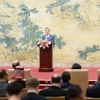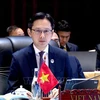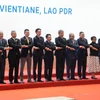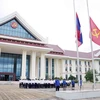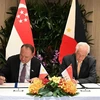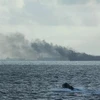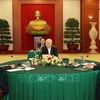An international seminar was held in Phnom Penh , Cambodia , on March 22 to mark the 10 th anniversary of the signing of the Declaration on Conduct of the Parties in the East Sea (DOC).
The seminar, themed “ASEAN and the 10 th anniversary of the signing of the DOC”, was co-organised by the Centre for Asian Strategic Studies (CASS) of India and the Cambodian Institute for Cooperation and Peace (CICP).
Co-chaired by CICP Director Cheang Vanaridh and CASS Director A.B Mahapatra, the event also drew the participation of more than 300 scholars, researchers and diplomats from Vietnam , Singapore , Indonesia , Laos , the Philippines , Malaysia , Japan , Russia , China and Cambodia .
The speakers at the seminar focused on reviewing 10 years of the signing and implementation of the DOC between ASEAN and China as well as putting forward measures to solve disputes.
Over the past 10 years, the declaration has played a role in maintaining peace and stability in the East Sea and the Southeast Asian region, they affirmed.
However, ASEAN and China should soon come to the building of a Code of Conduct (COC) in the East Sea to ensure long-term peace and stability in the region, they added.
According to speeches delivered at the seminar, the DOC is an important document that represents concerned parties’ determination to boost peace, stability and mutual trust towards the peaceful settlement of disputes in the East Sea , helping consolidate the ASEAN-China strategic partnership for peace and prosperity.
CASS Director A.B. Mahapatra said the seminar may bring new ideas and evaluate different options to deal with the current era’s most complicated maritime disputes, adding that the settlement of the East Sea disputes will be a big challenge for ASEAN’s effective foreign policy in turning the DOC into a full COC.
Dr. Cheam Yeap, a speaker from the host country, said that concerns over security and economic interests will continue affecting each country’s policies. However, principles and regulations of international law must serve as foundations for these policies.
Closely cooperating in implementing the DOC on the basis of mutual trust and abiding by the principles of UN and ASEAN Charters is the best way for ASEAN and China to deal with these issues, he stressed.
However, he said the DOC is yet to fully meet all aspirations of concerned parties as well as countries sharing strategic interests in the East Sea and reveals many shortcomings in preventing tensions and conflicts in the East Sea .
According to CICP Director Cheang Vanaridh, the East Sea issue is one of the most complex regional issues that requires an approach based on trust and law.
Countries should hold more dialogues and discussions to strengthen understanding about this issue, he said.
Dr. Vo Xuan Vinh from Vietnam ’s Southeast Asia Research Centre, was praised by other participants as he introduced the basic principles of a Code of Conduct, which, he said, ASEAN and China should sign as soon as possible.
He stressed that parties that get involved in the Code of Conduct need to affirm their commitments to the goals and principles of the 1982 UN Convention on the Law of the Sea and the Five Principles of Peaceful Coexistence in the spirit of the principles on the implementation of the DOC signed between ASEAN and China in Indonesia in November, 2011.
The seminar concluded that to address current threats of instabilities in the East Sea in a sound and long-term manner, concerned parties should promptly build a law-binding Code of Conduct that can fix the shortcomings of the DOC, on the basis of international law.-VNA
The seminar, themed “ASEAN and the 10 th anniversary of the signing of the DOC”, was co-organised by the Centre for Asian Strategic Studies (CASS) of India and the Cambodian Institute for Cooperation and Peace (CICP).
Co-chaired by CICP Director Cheang Vanaridh and CASS Director A.B Mahapatra, the event also drew the participation of more than 300 scholars, researchers and diplomats from Vietnam , Singapore , Indonesia , Laos , the Philippines , Malaysia , Japan , Russia , China and Cambodia .
The speakers at the seminar focused on reviewing 10 years of the signing and implementation of the DOC between ASEAN and China as well as putting forward measures to solve disputes.
Over the past 10 years, the declaration has played a role in maintaining peace and stability in the East Sea and the Southeast Asian region, they affirmed.
However, ASEAN and China should soon come to the building of a Code of Conduct (COC) in the East Sea to ensure long-term peace and stability in the region, they added.
According to speeches delivered at the seminar, the DOC is an important document that represents concerned parties’ determination to boost peace, stability and mutual trust towards the peaceful settlement of disputes in the East Sea , helping consolidate the ASEAN-China strategic partnership for peace and prosperity.
CASS Director A.B. Mahapatra said the seminar may bring new ideas and evaluate different options to deal with the current era’s most complicated maritime disputes, adding that the settlement of the East Sea disputes will be a big challenge for ASEAN’s effective foreign policy in turning the DOC into a full COC.
Dr. Cheam Yeap, a speaker from the host country, said that concerns over security and economic interests will continue affecting each country’s policies. However, principles and regulations of international law must serve as foundations for these policies.
Closely cooperating in implementing the DOC on the basis of mutual trust and abiding by the principles of UN and ASEAN Charters is the best way for ASEAN and China to deal with these issues, he stressed.
However, he said the DOC is yet to fully meet all aspirations of concerned parties as well as countries sharing strategic interests in the East Sea and reveals many shortcomings in preventing tensions and conflicts in the East Sea .
According to CICP Director Cheang Vanaridh, the East Sea issue is one of the most complex regional issues that requires an approach based on trust and law.
Countries should hold more dialogues and discussions to strengthen understanding about this issue, he said.
Dr. Vo Xuan Vinh from Vietnam ’s Southeast Asia Research Centre, was praised by other participants as he introduced the basic principles of a Code of Conduct, which, he said, ASEAN and China should sign as soon as possible.
He stressed that parties that get involved in the Code of Conduct need to affirm their commitments to the goals and principles of the 1982 UN Convention on the Law of the Sea and the Five Principles of Peaceful Coexistence in the spirit of the principles on the implementation of the DOC signed between ASEAN and China in Indonesia in November, 2011.
The seminar concluded that to address current threats of instabilities in the East Sea in a sound and long-term manner, concerned parties should promptly build a law-binding Code of Conduct that can fix the shortcomings of the DOC, on the basis of international law.-VNA


